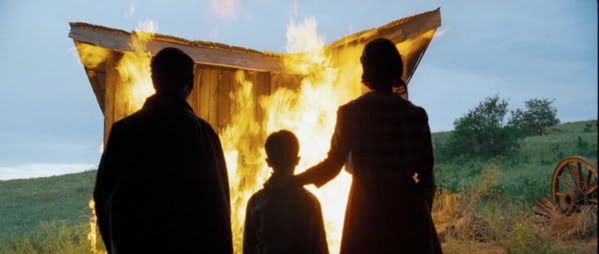Walk Hard: The Dewey Cox Story (Jake Kasdan, 2007)
 On the other side of the surprised-by-Americans spectrum from Sweeney Todd is Walk Hard, the hands-down funniest comedy of the year that couldn't make more than four million dollars on its opening weekend. Sure, it was a holiday weekend, but National Treasure 2 made 100 bazillion dollars or something. Seriously? SERIOUSLY? But enough overestimating the moviegoing public. Walk Hard is a spoof of the recent rags-to-riches musical biopics that are sure Oscar favorites. In fact, Reilly himself has been nominated for a Golden Globe for his performance as Dewey Cox, who chops his brother in half during a machete fight and spends the rest of his life trying to be "super-great" for both he and his brother. Along the way, he gets married at 14, makes a slew of hits, takes acid with The Beatles, wants to record an army of digeridoos, has a 70s variety show, hits rock bottom, and finds redemption (sort of). Everything you'd expect. Reilly is absolutely perfect in the role; hilarious and spot-on as Cox -- he's even a great musician. Kristin Wiig (who has grown on me in her last few years on Saturday Night Live) is hilarious as Cox's first wife; she delivers probably my favorite line in the movie ("It would if it never rained!" I almost choked laughing). Of course, Dewey leaves his wife when he gets famous, and eventually hooks up with his June Carter (Jenna Fischer, looking cute even though there's not much else to do). They have the most ridiculously tumultuous relationship in film history. Also pitch-perfect are Dewey's backup band, Tim Meadows, Chris Parnell, and Matt Besser, who all get a few big laughs. Lots of the Judd Apatow regulars (he produced it, after all) show up, like Paul Rudd, Jonah Hill, Jane Lynch, and more. The fact that this was such a box office bomb while Knocked Up and Superbad were such hits disappoints, but doesn't surprise, me. America just isn't ready to see John C. Reilly in a leading role, I suppose. For me, though, he is just wonderful -- I'd put him in my top 5 favorite actors, I think. I hope we see more big roles for him in the future, and America grows to love him like I do. But for now, all I can say is go see Walk Hard if you love to laugh. And who doesn't. 9/10 Labels: 2007, jake kasdan |












